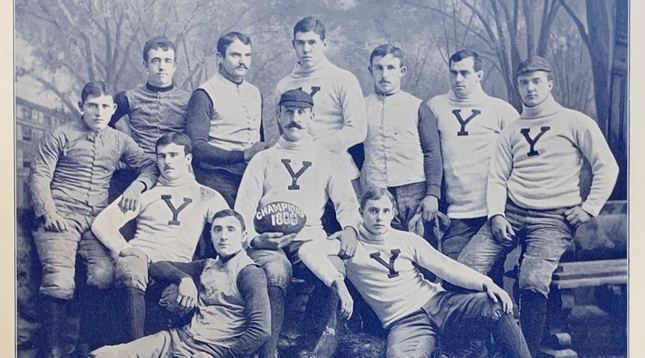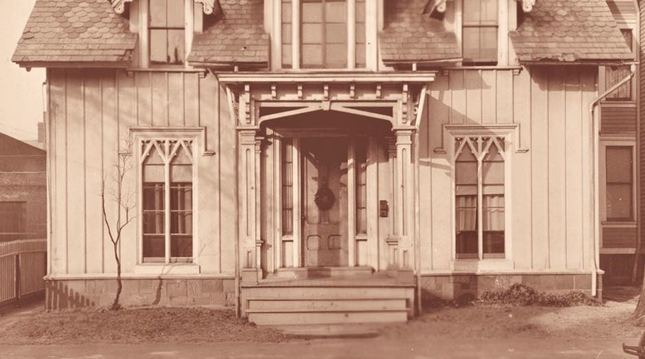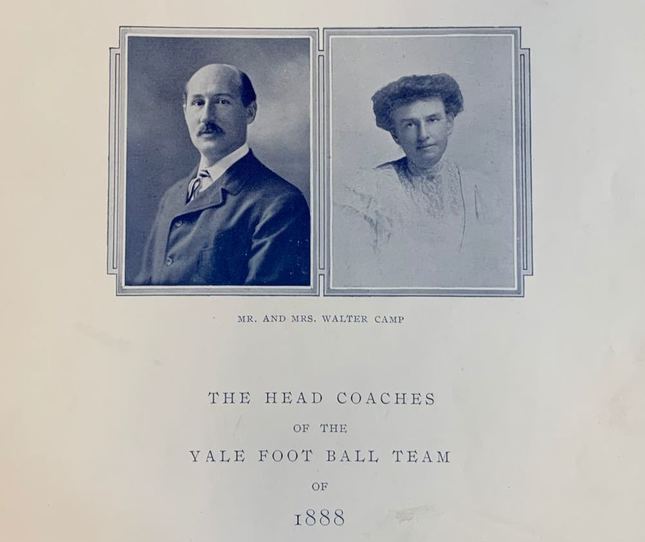_1125x625_0_164_645.jpeg)
Manuscripts and Archives
With her husband Walter, Alice Sumner Camp coached some of the most dominant teams in early college football.
View full image
_1125x625_0_164_82.jpeg)
Manuscripts and Archives
With her husband Walter, Alice Sumner Camp coached some of the most dominant teams in early college football.
View full image
_1264x703_0_70_645.jpeg)
Manuscripts and Archives
Walter Camp kept his day job at the New Haven Clock Company while coaching the Yale football team, so his wife Alice went to afternoon practices in his stead.
View full image
_1264x703_0_70_82.jpeg)
Manuscripts and Archives
Walter Camp kept his day job at the New Haven Clock Company while coaching the Yale football team, so his wife Alice went to afternoon practices in his stead.
View full image

Manuscripts and Archives
The 1888 team--the first coached by the Camps--outscored its 13 opponents 694 to 0.
View full image

Manuscripts and Archives
The 1888 team--the first coached by the Camps--outscored its 13 opponents 694 to 0.
View full image

Manuscripts and Archives
The Camps’ house, between the campus and the Yale playing fields, was the headquarters for evening strategy sessions.
View full image

Manuscripts and Archives
The Camps’ house, between the campus and the Yale playing fields, was the headquarters for evening strategy sessions.
View full image

Manuscripts and Archives
The program for a 1913 anniversary dinner for the 1888 team identified both Camps as their coaches.
View full image

Manuscripts and Archives
The program for a 1913 anniversary dinner for the 1888 team identified both Camps as their coaches.
View full image
American football has been around for more than 150 years, but it has only been in the last five years that women have begun to rise in the ranks of college football coaching: Callie Brownson became the first full-time assistant coach of a Division I team in 2018, when she was hired at Dartmouth, and Heather Marini was named quarterback coach at Brown two years later.
But those trailblazers had a predecessor. Indeed, the first man ever to be appointed a college football coach was assisted by a woman whom players considered to be one of their coaches: at a 1913 banquet celebrating the 25th anniversary of the legendary 1888 Yale team, the program identified the team’s head coaches as “Mr. & Mrs. Walter Camp.”
Mrs. Camp’s billing alongside her husband was well earned. Alice Sumner had married Walter Camp, Class of 1880—who would later become known as the father of American football—in the summer of 1888, the year the former Yale football captain was asked to coach his former team. Coaching was a new idea in football; until then, teams had been run by the student captains. When 1888 captain William Herbert Corbin ’89 invited Walter to be the team’s coach, he offered him “total charge” of the team—but no compensation.
So Walter kept the day job he had held since 1884 as an executive of the New Haven Clock Company. This meant he was often unable to make it to practice during working hours. Instead, Alice—known to the team as “Mrs. Walter”—went to practices with notebook in hand, writing down everything that happened and reporting to her husband.
But by all accounts, she was more than a messenger. Corbin later recalled that he would ask her advice during practices, saying that she “had a very superior knowledge of the strategy and value of different plays, and she knew as much about football as almost any man I knew. Her advice proved very valuable to us.”
In the evenings, Corbin, some graduate assistants, and sometimes some players would gather at the Camps’ house, off Chapel Street between the campus and the fields, to review Alice’s notes of the day’s activity and strategize. Someone who was there recalled Alice as the “generalissimo of high spirits” at the meetings.
Until she met Walter Camp, Alice Sumner had shown no interest in the young, rough-and-tumble game of football. Born in Hartford in 1861 to a working-class family, she was a half-sister to William Graham Sumner ’63, who became a Yale professor in 1872. He would go on to be one of the founders of the field of sociology and a shaper of conservative economic and social thought.
Alice’s childhood letters to “Brother Will” display an anxiety about her schoolwork and an eagerness to please her scholarly brother. “I don’t get along any better with arithmetic,” she wrote at age 11. “Grammar is my favorite study. I think parsing is splendid. I am very glad you think I improve in writing.” By 1878, as she was finishing high school in Hartford, she wrote to her brother, “I think I would very much like to be a teacher.”
In 1880, Alice came to live with Professor Sumner and his wife Jeannie in New Haven, where she helped to raise her two nephews. In 1884, she enrolled at the Welch Training School, a school for aspiring teachers. By 1885, she was teaching at Welch, and she soon became its principal.
Alice met Walter Camp in 1880, when he was a senior football star at Yale. They became engaged in 1886, and they were married at New Haven’s Trinity Church in June 1888. Alice gave up her teaching career when she got married, but that fall, she in effect took on a new job as the unpaid coach’s unpaid assistant.
For five years, Walter and Alice made a remarkably successful coaching team. In that first 1888 season, Yale won all 13 of its games and did not give up a single point, scoring 694 on its opponents. They lost just one game in each of the 1889 and 1890 seasons, and they were again undefeated in 1891 and 1892. The 1888, 1891, and 1892 teams are regarded by later analysts as national champions for those years.
After that, Walter Camp was head coach at Stanford for three years. Then he gave up coaching to focus on his business career and a number of side projects: shaping the rules of intercollegiate football, writing about sports, and developing a popular exercise routine called the Daily Dozen. Alice was actively involved in Walter’s endeavors while raising their children, Janet and Walter Jr.
Alice attracted praise and attention from all quarters. Former players wrote to her with news of their lives and opinions about current Yale football. A local society columnist described her as “a tall, stately woman, with a graceful, well-moulded figure,” and said she was “endowed with the quality of knowing exactly how to wear her gowns.” And the British novelist Arnold Bennett is said to have called her “one of the most brilliant women in America.”
Walter Camp died in 1925. Alice’s later years were clouded by pain and limited mobility as the result of a 1915 auto accident in New Haven. But before she died in 1934, she got to see the dedication of the Walter Camp Gateway at the Yale fields in 1928. At that dedication, All American halfback Sam Thorne ’96 paid tribute to both the Camps, remembering those strategy sessions at their home. “At those almost nightly meetings during the football season, you, Mrs. Camp, for many years, were usually present,” said Thorne. “And, if I may say so, your advice and counsel were looked upon as only second in importance to his.”
 loading
loading